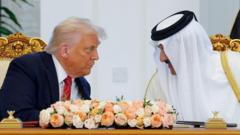Trump's critics, including Democrats, and even some of his staunch allies are questioning the ethics of accepting a Qatari luxury plane, highlighting concerns of corruption and foreign influence.
Bipartisan Backlash Against Trump's Qatar Plane Deal

Bipartisan Backlash Against Trump's Qatar Plane Deal
President Trump's decision to accept a $400 million luxury jet from Qatar faces accusations of bribery and corruption from both critics and some supporters.
In a surprising twist of events, President Donald Trump's decision to accept a luxury aircraft valued at $400 million from Qatar has ignited a rare moment of bipartisan criticism, uniting many across the nation's political spectrum in opposition. While Democratic detractors have predictably condemned the proposal, notable dissent has also emerged from within Trump's base, as prominent MAGA influencers voice apprehensions, dubbing the arrangement a "bribe" indicative of high-level corruption—the very issue Trump has long claimed to address.
The lavish Boeing 747-8 is earmarked for use by the U.S. Department of Defense as part of its Air Force One fleet. Currently, this fleet consists of aging 747-200 jets, with the new acquisition expected to undergo extensive refurbishing at a significant financial cost. Critics, including a number of conservative commentators, swiftly denounced the deal upon its announcement, with many asserting that Qatar’s gesture cannot be altruistic given its historical ties to terrorism—a claim that the Qatari government denies.
Political commentary emerged quickly, exemplified by Ben Shapiro from the Daily Wire labeling the plane as "skeezy" and expressing skepticism regarding Qatar’s motives. Others, like Laura Loomer, emphasized the potential dangers of accepting such a gift publicly, while even typically supportive media outlets voiced concerns; for instance, the New York Post directly criticized Trump's plan. Prominent Republicans such as Mark Levin, who have historically backed Trump, cast doubt on the wisdom of the plan, labeling Qatar a “terror state.”
In the wake of escalating criticism, the White House has vowed to maintain transparency, with Press Secretary Karoline Leavitt asserting legal compliance regarding the acceptance of gifts from foreign governments. Meanwhile, Trump defended the acquisition as beneficial, likening it to the historic gift of the Statue of Liberty, and describing the plane as essentially a governmental rather than personal gift.
Constitutional experts are contemplating the legality of such a gift, given that the Constitution prohibits officials from receiving presents from foreign states. The White House maintains that the aircraft is being presented to the U.S. government directly, thus sidestepping potential legal hurdles. However, skeptics have pointed out that Attorney General Pam Bondi, who facilitated the legal review, previously lobbied for Qatar, raising questions about her impartiality.
Despite consistent support at his rallies, some within Trump's party are voicing concern. Senator Rand Paul cautioned that the gift could obscure judgments about Qatar's human rights practices, while Senator Ted Cruz highlighted potential security risks inherent to accepting such a significant gift. On the other side, some Republicans, like Senator Tommy Tuberville, defended the acceptance, focusing on the financial practicality of not needing to spend taxpayer money.
As the backlash continues, political analysts note that while this scenario poses challenges for Trump, his adeptness at redefining narratives may ultimately shield his popularity within the base. Trump's history of transforming potential scandals into mere footnotes could pave the way for continued public support, irrespective of this turbulent chapter.





















